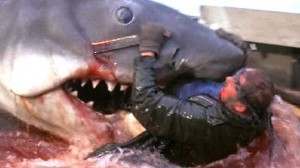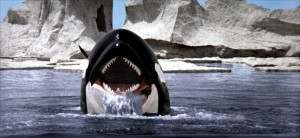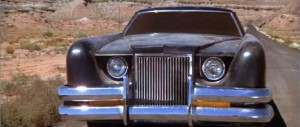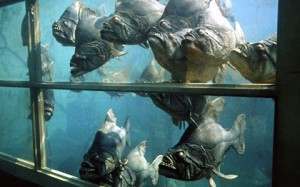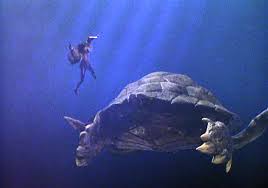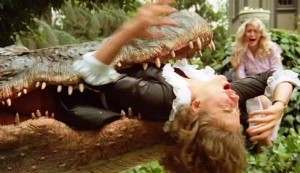In other posts here, I’ve recall the five best knock-offs of The Exorcist (1973), Star Wars (1977), and Alien (1979), but another key genre blockbuster from the 1970s also inspired a rash of imitators: Steven Spielberg’s Jaws, based on the best-selling novel by Peter Benchley.
From 1975 to 1979, basically, it “wasn’t safe to go back” to the theater, because every low-budget filmmaker with any degree of ambition was recreating the watery attacks of Jaws, only with different aquatic animals, from killer whales to piranha, substituting for the great white shark.
These knock-off movies had titles such as Tentacles (1977), Tintorera: Killer Shark (1975), Barracuda (1978), and Devil Fish (1978), to name just a few trend-followers.
Sometimes, really inventive Jaws knock-offs repeated the precise plot-line of the Spielberg film, but changed settings too. William Girdler’s Grizzly (1976), for instance, was set at a state park, not at the beach, and deployed a giant grizzly bear rather than a great white shark as the film’s menace.
So without further ado, here are the five best Jaws knock-offs of the late 1970s:
Orca (1977)
Never one to ignore a money-making opportunity, the late, great Dino De Laurentiis produced Orca: the Killer Whale, a film that premiered soon after Jaws made a killing at the box office. But while Orca features its share of brutal slayings and chomping — a very young Bo Derek sees her leg bitten off in one scene — the film also seeks to rip-off Herman Melville, or namely, Moby Dick.
Only this case, it is not a human obsessed with a whale, but a whale who is obsessed with a human. How’s that for high concept?
When Richard Harris’s sea farer Nolan s harpoons a happyOrca’s mate and drags her over his ship, she spontaneously aborts, and the calf splatters bloodily on the deck. Having lost everything, the male Orca pursues Nolan to the ends of the world to wreak his revenge. In the course of the film, we come to understand the whale’s loss since the scientist portrayed by Charlotte Rampling informs us that killer whales are monogamous. They mate for life.
What makes Orca a compelling film, perhaps, is not the attacks by the creature known as “the bringer of death,” according to the film, or even the reversal of the Moby Dick premise, but rather Nolan’s sense of self-hatred after killing the female Orca. His own wife, while pregnant, was struck down by a drunk driver, and so now he has become the very creature he has spent years hating.
“Can you commit a sin against an animal?” Nolan asks a priest at one point. The man of the cloth’s response is that “sins are really against one self,” and that line explains Nolan’s conflicted character well.
I once described Orca as Death Wish (1975) only with a killer whale in the Charles Bronson role, and the film, oddly enough, thrives on that basis too. It’s a revenge picture at sea, pure and simple, and much better than Jaws: The Revenge, which makes mincemeat out of the same “revenge” device.
The Car (1977)
An over-sized black sedan (possibly driven by the Devil himself…) prowls the desert roads of Santa Ynez, California in director Elliot Silverstein’s Jaws-on-land, The Car.
Much Like Roy Scheider’s Brody, James Brolin’s character, Parent, is a police officer: a deputy who becomes sheriff. The Spielberg film’s “beaches stay closed” paradigm is also resurrected, but with the evil car threatening a town parade instead of the summer beach economy.
The Car even aims for “quirky local color” (exemplified by the town of Amity in Jaws), but with Santa Ynez filling in.
A highway-horror like Duel (1971), or Race with the Devil (1975), The Car generates some solid suspense in its last act, despite the strange concept of a car as a natural predator.
There’s something naïve and charming about this imitation of a genre classic, and the film’s stunts still look good. The Car’s final reveal, of a demonic specter evacuating the destroyed evil vehicle, is also quite memorable, even today.
Piranha (1978)
With Joe Dante (The Howling [1981], Gremlins [1984]) at the helm, Piranha is pretty much all one hopes the film would be: a wickedly funny film that appropriates the central conceit of Jaws –swimmers imperiled by fish — but nonetheless is “in” on the joke that the movie is a rip-off.
Accordingly, Piranha emerges as a kind of low-budget horror masterpiece, both funny and scary. The “beaches stay closed” plot-line from Jaws again gets play, but this time at a marine amusement park called Aquarena Water Resort.
And instead of alluding to the conspiracy that got play in Spielberg’s film, namely Watergate, the horror here involves another 1970s touchstone — the Vietnam War — and a secret experiment to create a biological weapon of war.
Piranha is tremendous fun because of the visual homages (a beachgoer is seen reading Moby Dick, and one character, played by Heather Menzies, plays a Jaws video game in an arcade…) but the horror scenes are remarkably effective too, as severed limbs fill the screen, and lake-water runs blood red.
The Bermuda Depths (1978)
This Rankin-Bass production actually aired on American television, but fits the bill as an unconventional Jaws knock-off. Here, sailors are menaced in the Devil’s Triangle by a giant turtle called a “Cryptodira.”
But at the same time, a young man, Magnus (Leigh McCloskey) falls in love with a ghost, Jennie Haniver (Connie Sellecca) who is inextricably linked to the over-sized sea turtle. Also in the mix is Eric (Carl WeatherS), who serves as the movie’s Captain Ahab figure, a scientist obsessed with studying the “gigantism” of local sea life.
Oddly-paced and strangely surreal, The Bermuda Depths features the sea battles one expects from the post-Jaws milieu, including Eric’s misguided harpooning of the turtle, and ends with an oddly poetic image confirming the eternal nature of love.
Of all the Jaws knock-offs, The Bermuda Depths was perhaps the only one that steered the sub-genre towards romance.
Alligator (1980)
In Lewis Teague’s rip-roaring Alligator, another policeman (this time played by cult-favorite Robert Forster) investigates yet another animal threat to an unsuspecting populace, this time an oversized alligator in New York sewers.
And much as Brody brings in Quint to save Amity, Detective Madison (Forster) teams up with a big game hunter, Colonel Brock (Henry Silva) to defeat the carnivorous animal menace. In both cases the “experienced” hand gets eaten, while the film’s policemen hero saves the day.
There’s a conspiracy angle too, with big-business up to no good, and ultimately proven responsible for the abnormal grown of reptilian predator.
But despite all the abundant familiarities to Jaws, Alligator is sharp and scary, especially in the way it harnesses the old urban legend about baby alligators in the Big Apple’s sewer system.
In my book Horror Films of the 1980s, I interviewed director Teague and he told me that his goal was to make an “amusing” horror film, and he succeeded to such a degree that even Vincent Canby at the New York Times awarded Alligator a rave review.
A great horror movie, Alligator also became a cult-favorite, and one of Jaws’ most beloved cinematic children.
Would you like to support Flashbak?
Please consider making a donation to our site. We don't want to rely on ads to bring you the best of visual culture. You can also support us by signing up to our Mailing List. And you can also follow us on Facebook, Instagram and Twitter. For great art and culture delivered to your door, visit our shop.
